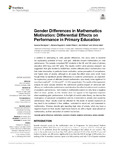Mostrar o rexistro simple do ítem
Success in Mathematics and Academic Wellbeing in Primary-School Students
| dc.contributor.author | Rodríguez, Susana | |
| dc.contributor.author | Regueiro, Bibiana | |
| dc.contributor.author | Piñeiro, Isabel | |
| dc.contributor.author | Valle, Antonio | |
| dc.contributor.author | Sánchez, Benigno | |
| dc.contributor.author | Vieites, Tania | |
| dc.contributor.author | Rodríguez-Llorente, Carolina | |
| dc.date.accessioned | 2020-06-12T09:37:21Z | |
| dc.date.available | 2020-06-12T09:37:21Z | |
| dc.date.issued | 2020 | |
| dc.identifier.citation | Rodríguez, S.; Regueiro, B.; Piñeiro, I.; Valle, A.; Sánchez, B.; Vieites, T.; Rodríguez-Llorente, C. Success in Mathematics and Academic Wellbeing in Primary-School Students. Sustainability 2020, 12, 3796. https://doi.org/10.3390/su12093796 | es_ES |
| dc.identifier.uri | http://hdl.handle.net/2183/25704 | |
| dc.description.abstract | [Abstract] The main aim of this study was to analyse possible differences in academic wellbeing on the basis of prior academic achievement in mathematics. We conceptualised wellbeing as a multidimensional construct covering both negative indicators, namely, anxiety and negative feelings, and positive indicators, namely, perceived competence, perceived utility, and mastery motivation. Success in mathematics is expected to be associated with better academic wellbeing. The sample consisted of 897 students from the fifth and sixth years of primary school (50.2% boys and 49.8% girls). Results suggested that success in mathematics is linked to a student’s academic wellbeing, in such a way that perceived competence in the subject, perception of usefulness of mathematical content, and mastery motivation was higher in students with better previous performance. Anxiety and negative feelings were also lower when success in mathematics increased. Considering the particular anxiety–self-efficacy interaction suggested by previous research, we concluded that a good way to change negative academic wellbeing would be to increase successful experiences to foster perceived competence, especially in students with high academic anxiety. | es_ES |
| dc.description.sponsorship | This work was carried out thanks to funding from research projects EDU2013-44062-P (MINECO, Ministerio de Economía, Industria y Competitividad, Gobierno de España) and EDU2017-82984-P (MEIC, Ministerio de Economía y Competitividad), and to the financing received by one of the authors in the FPU programme (MCIU, Ministerio de Educación, Cultura y Deporte) | es_ES |
| dc.language.iso | eng | es_ES |
| dc.relation | info:eu-repo/grantAgreement/MINECO/Plan Estatal de Investigación Científica y Técnica y de Innovación 2013-2016/EDU2013-44062-P/ES/RELACION ENTRE DEBERES ESCOLARES Y RENDIMIENTO ACADEMICO: UNA PERSPECTIVA MULTINIVEL Y LONGITUDINAL | |
| dc.relation | info:eu-repo/grantAgreement/AEI/Plan Estatal de Investigación Científica y Técnica y de Innovación 2017-2020/EDU2017-82984-P/ES/CALIDAD Y EQUIDAD EN LA PRESCRIPCION DE DEBERES ESCOLARES: DISEÑO E IMPLEMENTACION DE PROPUESTAS BASADAS EN EVIDENCIAS EMPIRICAS | |
| dc.relation.uri | https://doi.org/10.3390/su12093796 | es_ES |
| dc.rights | Atribución 4.0 Internacional | es_ES |
| dc.rights.uri | http://creativecommons.org/licenses/by/4.0/ | * |
| dc.subject | Prior academic achievement | es_ES |
| dc.subject | Academic wellbeing | es_ES |
| dc.subject | Math | es_ES |
| dc.subject | Primary education | es_ES |
| dc.title | Success in Mathematics and Academic Wellbeing in Primary-School Students | es_ES |
| dc.type | info:eu-repo/semantics/article | es_ES |
| dc.rights.access | info:eu-repo/semantics/openAccess | es_ES |
| UDC.journalTitle | Sustainability | es_ES |
| UDC.volume | 12 | es_ES |
| UDC.issue | 9 | es_ES |
| dc.identifier.doi | 10.3390/su12093796 |
Ficheiros no ítem
Este ítem aparece na(s) seguinte(s) colección(s)
-
GI-GIPED - Artigos [57]






